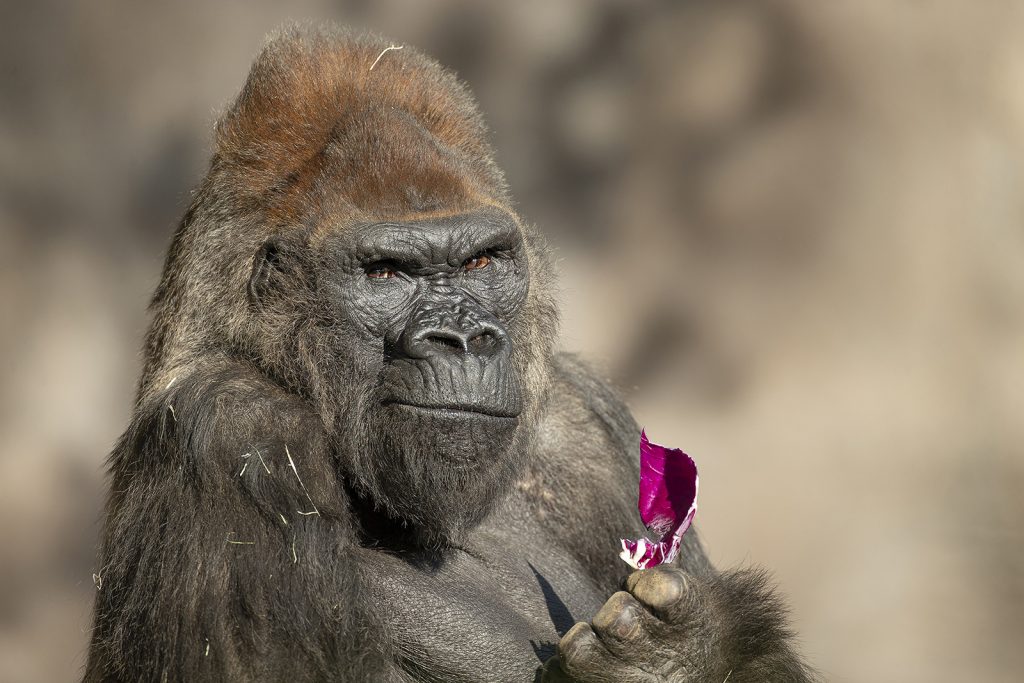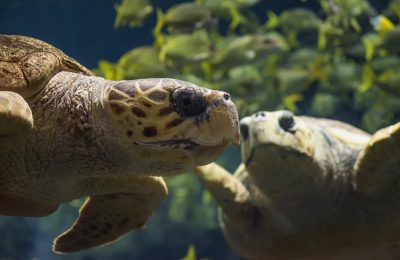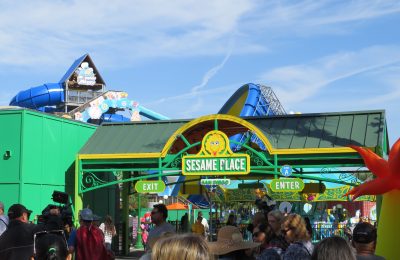
Visiting the western lowland gorilla troop at the San Diego Zoo Safari Park is a tradition for many at the world-famous wildlife sanctuary—and starting today (Saturday, Feb. 13, 2021), guests will once again have the opportunity to connect with these primates, and learn ways they can help to save this important species.
Guest access to see the gorillas had been limited over the last month after several troop members were diagnosed with SARS-CoV-2, the virus that causes COVID-19. This morning, guests had the opportunity to see the eight-member troop eating, drinking and interacting with one another—having fully recovered, thanks to the incredible work of wildlife care professionals, the veterinary team and collaborations with a wide array of colleagues and partners who ensured that the highest standard of care was given to the affected gorillas.
“We’re so grateful for the outpouring concern and support we’ve received while the troop safely recovered,” said Lisa Peterson, executive director of the San Diego Zoo Safari Park. “We’re thrilled to share the joy that this beloved troop brings to our community and to our guests.”
Despite team members adhering to all recommended biosecurity precautions, several members of the Safari Park gorilla troop tested positive for the virus on Jan. 11. The gorillas were infected with the B.1.429 lineage of the coronavirus, which has been prevalent in California and may be more contagious than other strains. The entire troop remained under close observation following the diagnosis, when some gorillas showed symptoms including mild coughing, congestion, nasal discharge and intermittent lethargy.
San Diego Zoo Global joined forces with multiple local, state and national leaders in the medical, scientific, zoological and public health communities to provide the best possible care for the gorilla troop. These colleagues include professionals from San Diego County Health and Human Services Agency, UC San Diego Health, Rady Children’s Hospital–San Diego, the Scripps Research Institute, California Animal Health and Food Safety Laboratory System, California Department of Food and Agriculture, California Department of Public Health, California Department of Fish and Wildlife, U.S. Department of Agriculture National Veterinary Services Laboratories, USDA Animal and Plant Health Inspection Service, Centers for Disease Control and Prevention, Food and Drug Administration Center for Veterinary Medicine, The Great Ape Heart Project based at Zoo Atlanta and Chicago Zoological Society Radiology Consulting Service.
“There’s a such a warm camaraderie felt with our colleagues as we continue to share knowledge,” said Peterson. “We’re incredibly thankful for the collaboration across various areas of expertise to ensure the best health for our troop and a deep understanding of the interconnectedness of all living things.”
While the sharing of information and what was learned from this experience has already begun among wildlife care professionals at over 200 zoos worldwide, San Diego Zoo Global is committed to providing resources from occurrences at its sanctuaries in San Diego to conservation organizations around the world. Documentation of the SARS-CoV-2 virus in gorillas at the San Diego Zoo Safari Park may help provide important information regarding scientific understanding of the virus and its effects on great apes. Also, information learned about curbing zoonotic disease transmission, biosecurity protocols for wildlife in managed care and field settings, and its implications will be vital to ensuring optimal health outcomes for humans and wildlife globally.
Guests can visit the gorilla troop at their home in the Safari Park’s Gorilla Forest. The Safari Park is currently open from 9 a.m. to 5 p.m. daily. For more information, visit SDZSafariPark.org
As a leader in conservation, the work of San Diego Zoo Global includes on-site wildlife conservation efforts (representing both plants and animals) at the San Diego Zoo, San Diego Zoo Safari Park, and San Diego Zoo Institute for Conservation Research, as well as international field programs on six continents. The work of these entities is made accessible to over 1 billion people annually, reaching 150 countries via news media, social media, our websites and the San Diego Zoo Kids network in children’s hospitals in 13 countries. The work of San Diego Zoo Global is made possible with support from their incredible donors committed to saving wildlife around the globe.
Photos and Press Release courtesy San Diego Zoo.
Stay tuned for more theme park information, and be sure to get social with us on Facebook , Instagram, Twitter @BehindThrills for the latest updates! For our latest theme park videos please be sure to subscribe to us on YouTube!




